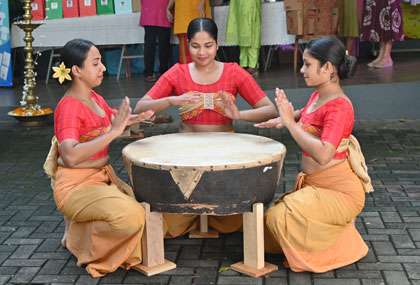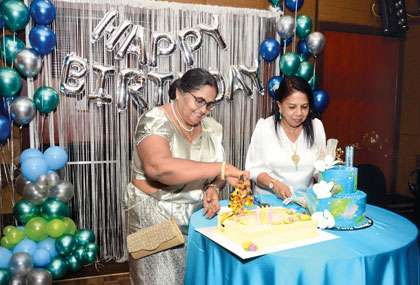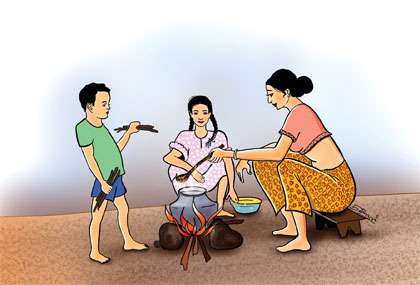Sulochana Dissanayake
{{hitsCtrl.values.hits}}
5 December 2014 10:28 am
Bringing stories to life
By Shihara MaduwageSulochana Dissanayake is a young and vibrant personality who has chosen rather an unusual path as her career. She has combined her love for theatre and arts to revive an age-old and somewhat ignored craft. She uses her creative energy and her passion to tell stories using larger-than-life puppets. Sulochana describes herself as a theatre-creator, educator and a puppeteer who narrates stories for a living. Sulochana is also exploring new ways to use performance arts to heal. She is studying how puppetry and theatre can be used for psychological and emotional therapy and developmental purposes. LW spoke to Sulochana to find out more about her unique interest.
 You have an organisation called ‘Power of Play.’ Could you tell us about that and what it does?
I established Power of Play (PVT) LTD in November 2011. Basically we are a company that utilizes performing arts as a tool for communication, development and reconciliation.Through Power of Play, we are able to provide innovative, creative solutions to diverse audiences by conceptualizing various programmes, using puppetry, theatre, music and visual art to educate through entertainment.
All our programmes are the result of many hours of research and conceptualizing by a group of experts outsourced by the company, ranging from talented scriptwriters and artists to academics and industry experts. My performers are usually hired from the Faculty of the Performing Arts and conceptualizing is done with the contribution of diverse experts handpicked for each project. Lucky for me, I seem to have a knack of picking the right people for the job because genuine teamwork is essential for the successful completion of each innovation.
You have a special interest in puppetry, as I understand. What inspired you to get into puppetry which is a rather unusual field? Was it something you always wanted to do?
Puppets are as old as people. They have been used as far back as in the ancient civilizations of Egypt, Greece, India and Japan to relate tales from epic literature, satirize current political scenarios and represent the zeitgeist of their times – and it was a simple and highly entertaining way of communicating to the common people. This is what I discovered when I took the opportunity to study the use of puppetry in other developing countries before I moved back home, and I established Power of Play based on that discovery. There is very little that a puppet cannot do or talk about. Frankly I can’t imagine life without my puppets.
You have an organisation called ‘Power of Play.’ Could you tell us about that and what it does?
I established Power of Play (PVT) LTD in November 2011. Basically we are a company that utilizes performing arts as a tool for communication, development and reconciliation.Through Power of Play, we are able to provide innovative, creative solutions to diverse audiences by conceptualizing various programmes, using puppetry, theatre, music and visual art to educate through entertainment.
All our programmes are the result of many hours of research and conceptualizing by a group of experts outsourced by the company, ranging from talented scriptwriters and artists to academics and industry experts. My performers are usually hired from the Faculty of the Performing Arts and conceptualizing is done with the contribution of diverse experts handpicked for each project. Lucky for me, I seem to have a knack of picking the right people for the job because genuine teamwork is essential for the successful completion of each innovation.
You have a special interest in puppetry, as I understand. What inspired you to get into puppetry which is a rather unusual field? Was it something you always wanted to do?
Puppets are as old as people. They have been used as far back as in the ancient civilizations of Egypt, Greece, India and Japan to relate tales from epic literature, satirize current political scenarios and represent the zeitgeist of their times – and it was a simple and highly entertaining way of communicating to the common people. This is what I discovered when I took the opportunity to study the use of puppetry in other developing countries before I moved back home, and I established Power of Play based on that discovery. There is very little that a puppet cannot do or talk about. Frankly I can’t imagine life without my puppets.
 How important do you think is theatre and drama to our life?
Incredibly important! For one, the power of theatre and drama to reflect our personal and professional lives, to teach us, to wake us up to reality, to reveal our subconscious thoughts and innermost prejudices ….is immeasurable.
On the other hand, all of us play different roles in different areas of our lives. Theatre and drama can help us understand those roles better. At Power of Play, we use dynamic forms of performing arts to promote social and cultural responsibilities, but in ways that can also be adapted to corporate requirements to empower people to identify their full potential.
For example, our unique training programmes mainly employ actor training techniques to develop ‘soft’ inter-personal skills required for success in the workplace, where participants are exposed to the importance of fine-tuning mind, body and voice for effective communications. Minimal yet memorable use of props and puppets for engaging presentations is also explored in detail to improve self-confidence and personality development. I am not a big fan of hand outs and power point presentations! I believe that the best learning comes through in practicals.
Based on my experience I am well aware of how theatre techniques teach individuals creative analysis and ways to connect efficiently with each other using limited resources. These insights help me customize training packages for clients who are looking to develop specific skills.
What kind of role does puppetry play in drama and theatre?
Satire is a powerful tool; and there is nothing quite like a puppet to convey it. Puppets are not just capable of comic, light-hearted entertainment - a heavy, underlying social critique is often present in any puppet performance.
For example one of the first things we did via Power of Play was to update those much-loved stars of many folk tales – Mahadanamuttha and his Gola Pirisa. These puppets have been adjusted to appeal to contemporary audiences. We took artistic liberty in adapting their identities while staying true to the language and idiosyncrasies of their original characters. The original five disciples were all Sinhalese, male youth. We introduced the new golayas who are family members/friends of the old ones to represent all communities of Sri Lanka so modern audiences can easily relate to these adapted stories which reflect current realities. The overall concept is to capture the importance of democracy in reaching decisions that impact communities through open and usually hilarious dialogue that allows everyone to contribute to conversations that initiate positive behavioral changes in individuals, leading to intelligent and mutually respectful communities.
Mahadanamutta and his new group of multi-ethnic disciples are also a representation of the need for engagement and social dialogue between all living communities in Sri Lanka, in order to reconcile and move forward as a progressive, harmonious society.
Another reason why puppets play such a key role is that you can’t get angry at a puppet. When a human performer gets on stage the audience immediately begins to judge or make assumptions, personal feelings and perceptions enter in and can cloud the message that is being delivered. With a puppet none of that happens and it provides the audience with the safety of viewing the issue(s) objectively. A completely genuine channel of communication is created between puppet and audience.
As an experienced puppeteer could you tell us some of the ways puppetry can be effectively used to communicate a message?
The challenge in using puppets to communicate to audiences in Sri Lanka, especially youth, was competing with cartoons! Therefore we have now evolved our expertise so that we can use puppets and create short films, advertisements and trailers and reach our young audiences via television, film and the Internet.
However, the power of a live performance cannot be diminished or replaced and we have been privileged to utilize live performance to work with youth on various, crucial issues related to their development and well-being - such as teenage pregnancies, HIV/AIDS awareness and the impact of technology and the Internet.
My African and Indonesian experiences proved that cultural and social relevance is vital for success when introducing novel forms of communication. That is what led me back to Mahadanamutta and our country’s wealth of folk literature. Often they form the familiar basis on which we build unusual and current performances that capture modern audiences.
You have described yourself as an educator. How do you use puppetry to spark off a child’s interest in literature and culture?
Doing this has been at the core of our work since inception. Every month we have two performances of Sybil Wettasinghe’s classic tales and other folk tales. The Sinhala performance takes place at Expographic Book store in Pelawatta and the English at Cargills Bookcity at Majestic City.
Starting this December we will also be performing two weekends a month at Apey Gama. The formula for these performances is simple and incredibly effective – take one of Sybil Nenda’s incredible stories and bring it to life through interactive dramatized narrations using music, movement and puppetry. This is not just about reading to a child, it is a complete 4D experience; drawing the audience in and making them part of the narrative. It is a great way for children to really immerse themselves in a story and it fires up their imaginations. They always come back for more!
We are also capable of organizing birthday parties with a difference. Instead of defaulting to Disney and Marvel for inspiration we organize traditional birthday parties that include Sri Lankan games, activities and stories with a puppet show/interactive story that feature a traditional folk tale. We think it’s important that children discover the fascination of our own culture, and learn to appreciate its richness in a totally entertaining and fun way! We can also customize puppet shows that fit into any theme that parents have in mind.
Apart from theatre, what are your other interests?
Reading, writing, listening to music, singing, cycling, walking, canoeing, spending time with family, meditation.
How important do you think is theatre and drama to our life?
Incredibly important! For one, the power of theatre and drama to reflect our personal and professional lives, to teach us, to wake us up to reality, to reveal our subconscious thoughts and innermost prejudices ….is immeasurable.
On the other hand, all of us play different roles in different areas of our lives. Theatre and drama can help us understand those roles better. At Power of Play, we use dynamic forms of performing arts to promote social and cultural responsibilities, but in ways that can also be adapted to corporate requirements to empower people to identify their full potential.
For example, our unique training programmes mainly employ actor training techniques to develop ‘soft’ inter-personal skills required for success in the workplace, where participants are exposed to the importance of fine-tuning mind, body and voice for effective communications. Minimal yet memorable use of props and puppets for engaging presentations is also explored in detail to improve self-confidence and personality development. I am not a big fan of hand outs and power point presentations! I believe that the best learning comes through in practicals.
Based on my experience I am well aware of how theatre techniques teach individuals creative analysis and ways to connect efficiently with each other using limited resources. These insights help me customize training packages for clients who are looking to develop specific skills.
What kind of role does puppetry play in drama and theatre?
Satire is a powerful tool; and there is nothing quite like a puppet to convey it. Puppets are not just capable of comic, light-hearted entertainment - a heavy, underlying social critique is often present in any puppet performance.
For example one of the first things we did via Power of Play was to update those much-loved stars of many folk tales – Mahadanamuttha and his Gola Pirisa. These puppets have been adjusted to appeal to contemporary audiences. We took artistic liberty in adapting their identities while staying true to the language and idiosyncrasies of their original characters. The original five disciples were all Sinhalese, male youth. We introduced the new golayas who are family members/friends of the old ones to represent all communities of Sri Lanka so modern audiences can easily relate to these adapted stories which reflect current realities. The overall concept is to capture the importance of democracy in reaching decisions that impact communities through open and usually hilarious dialogue that allows everyone to contribute to conversations that initiate positive behavioral changes in individuals, leading to intelligent and mutually respectful communities.
Mahadanamutta and his new group of multi-ethnic disciples are also a representation of the need for engagement and social dialogue between all living communities in Sri Lanka, in order to reconcile and move forward as a progressive, harmonious society.
Another reason why puppets play such a key role is that you can’t get angry at a puppet. When a human performer gets on stage the audience immediately begins to judge or make assumptions, personal feelings and perceptions enter in and can cloud the message that is being delivered. With a puppet none of that happens and it provides the audience with the safety of viewing the issue(s) objectively. A completely genuine channel of communication is created between puppet and audience.
As an experienced puppeteer could you tell us some of the ways puppetry can be effectively used to communicate a message?
The challenge in using puppets to communicate to audiences in Sri Lanka, especially youth, was competing with cartoons! Therefore we have now evolved our expertise so that we can use puppets and create short films, advertisements and trailers and reach our young audiences via television, film and the Internet.
However, the power of a live performance cannot be diminished or replaced and we have been privileged to utilize live performance to work with youth on various, crucial issues related to their development and well-being - such as teenage pregnancies, HIV/AIDS awareness and the impact of technology and the Internet.
My African and Indonesian experiences proved that cultural and social relevance is vital for success when introducing novel forms of communication. That is what led me back to Mahadanamutta and our country’s wealth of folk literature. Often they form the familiar basis on which we build unusual and current performances that capture modern audiences.
You have described yourself as an educator. How do you use puppetry to spark off a child’s interest in literature and culture?
Doing this has been at the core of our work since inception. Every month we have two performances of Sybil Wettasinghe’s classic tales and other folk tales. The Sinhala performance takes place at Expographic Book store in Pelawatta and the English at Cargills Bookcity at Majestic City.
Starting this December we will also be performing two weekends a month at Apey Gama. The formula for these performances is simple and incredibly effective – take one of Sybil Nenda’s incredible stories and bring it to life through interactive dramatized narrations using music, movement and puppetry. This is not just about reading to a child, it is a complete 4D experience; drawing the audience in and making them part of the narrative. It is a great way for children to really immerse themselves in a story and it fires up their imaginations. They always come back for more!
We are also capable of organizing birthday parties with a difference. Instead of defaulting to Disney and Marvel for inspiration we organize traditional birthday parties that include Sri Lankan games, activities and stories with a puppet show/interactive story that feature a traditional folk tale. We think it’s important that children discover the fascination of our own culture, and learn to appreciate its richness in a totally entertaining and fun way! We can also customize puppet shows that fit into any theme that parents have in mind.
Apart from theatre, what are your other interests?
Reading, writing, listening to music, singing, cycling, walking, canoeing, spending time with family, meditation.
 What are some of your future aspirations?
At the moment we are very excited about starting our programme at Apey Gama in December. We will be there on Saturday and Sunday morning – two weekends of the month, with a special interactive performance. We think Apey gama is a fantastic location and is a wonderful way to give urban children an authentic experience of village life.
We are also taking ‘Camp Kreativ’ – our holiday creative arts program to Galle and are thrilled to partner with Serendipity Trust who will host our drama and puppetry workshops on 22nd December 2014 at their office for 4-6 & 7-13 year olds.
We are also looking forward to being out and about at various locations over the Christmas season with our Giant Santa and a host of other colourful and entertaining performances.
2015 is also set to be an exciting year for us since we will be starting regular drama and puppetry classes under our ‘Camp Kreativ’ banner. These will take place on Thursdays from 4 – 6.30pm at ABC Preschool on 28th Lane and are open for 4-6 and 7-13 year olds. More details about our work can be found on our FB page will be available on www.facebook.com/powerinfoplay or interested parties can email us at [email protected]
What kind of support do you get from your family and friends?
My family has always supported me 100%. They are my most fervent fans and also my most constructive critics. My parents rarely miss a performance and are always on hand with advice, insight and guidance. They are a true inspiration, and have the kind of attitude that I think all parents should have – the ability to trust their children, work with them to fulfill their dreams and build their talents and to have the courage and faith to support them and enable them to reach their goals – in good times and bad.
Is there anything else you would like to add?
I am currently studying Drama Therapy at Samutthana - Kings College London Centre for Trauma, Displacement and Mental Health - to formally learn how Drama can be utilized for therapeutic and developmental purposes. I’m also engaged in puppet play back theatre which was taught by Dr. Nira Kaplansky, an Israeli psychologist and drama therapist who utilizes puppets and theater for therapeutic work.
I am very excited about exploring novel avenues of healing through performance, and will be using what I have learned to help enhance the principles of drama therapy in all our performances and programs in 2015.
Photographs by Nirmala Dhananjaya
What are some of your future aspirations?
At the moment we are very excited about starting our programme at Apey Gama in December. We will be there on Saturday and Sunday morning – two weekends of the month, with a special interactive performance. We think Apey gama is a fantastic location and is a wonderful way to give urban children an authentic experience of village life.
We are also taking ‘Camp Kreativ’ – our holiday creative arts program to Galle and are thrilled to partner with Serendipity Trust who will host our drama and puppetry workshops on 22nd December 2014 at their office for 4-6 & 7-13 year olds.
We are also looking forward to being out and about at various locations over the Christmas season with our Giant Santa and a host of other colourful and entertaining performances.
2015 is also set to be an exciting year for us since we will be starting regular drama and puppetry classes under our ‘Camp Kreativ’ banner. These will take place on Thursdays from 4 – 6.30pm at ABC Preschool on 28th Lane and are open for 4-6 and 7-13 year olds. More details about our work can be found on our FB page will be available on www.facebook.com/powerinfoplay or interested parties can email us at [email protected]
What kind of support do you get from your family and friends?
My family has always supported me 100%. They are my most fervent fans and also my most constructive critics. My parents rarely miss a performance and are always on hand with advice, insight and guidance. They are a true inspiration, and have the kind of attitude that I think all parents should have – the ability to trust their children, work with them to fulfill their dreams and build their talents and to have the courage and faith to support them and enable them to reach their goals – in good times and bad.
Is there anything else you would like to add?
I am currently studying Drama Therapy at Samutthana - Kings College London Centre for Trauma, Displacement and Mental Health - to formally learn how Drama can be utilized for therapeutic and developmental purposes. I’m also engaged in puppet play back theatre which was taught by Dr. Nira Kaplansky, an Israeli psychologist and drama therapist who utilizes puppets and theater for therapeutic work.
I am very excited about exploring novel avenues of healing through performance, and will be using what I have learned to help enhance the principles of drama therapy in all our performances and programs in 2015.
Photographs by Nirmala Dhananjaya
Leave a reply
Reply To:
Name - Reply Comment










Comments